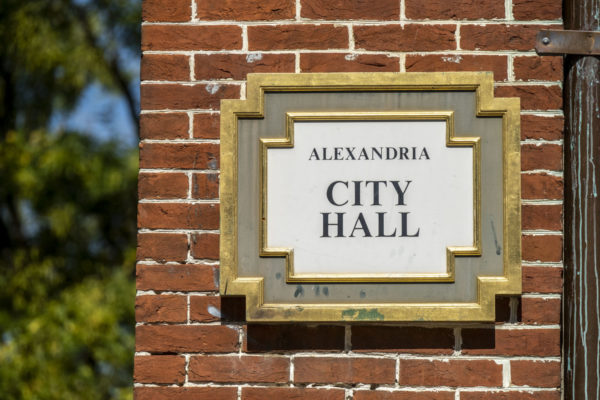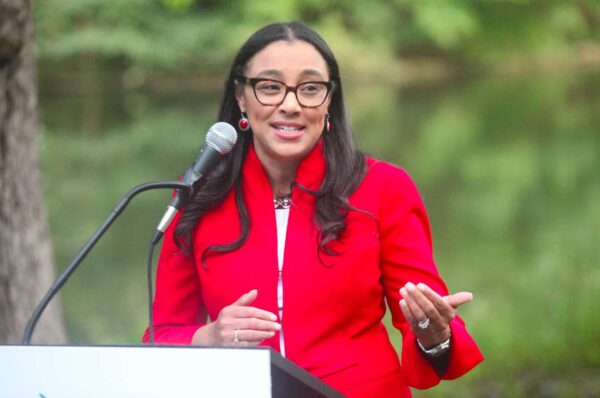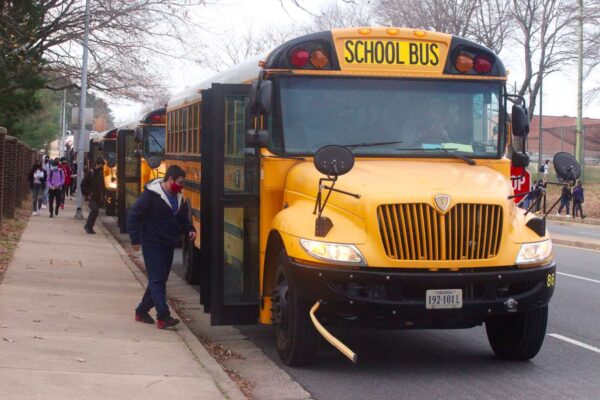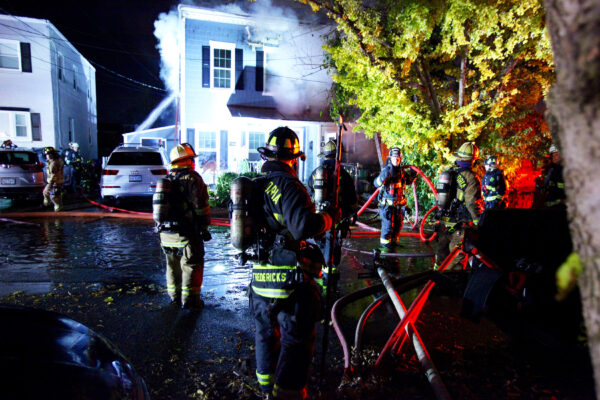
If Alexandria wants to hold onto its most skilled staff members, the Alexandria Planning Commission chair said the city government will need to pony up and pay more competitive wages.
A letter (item 10) drafted by Planning Commission Chair Nathan Macek offered some guidance for the upcoming budget and some nudges toward more transportation funding and employee compensation.
“We encourage the City to evaluate and adjust the compensation of staff engaged in planning activities to provide salaries and benefits competitive with other government agencies and private employers in the Washington metropolitan area,” Macek wrote. “We note the departure of several capable staff members in recent years who might have been retained had the City’s compensation kept pace with regional market conditions. Efforts to reward and retain staff will promote a high-caliber workforce and facilitate the development and implementation of the City’s plans.”
The letter is scheduled for review at a Planning Commission meeting tonight (Tuesday) before going to the City Council.
Macek wrote that it’s critical that enough funding be allocated for staff to properly handle the workload of the many projects ongoing around the city, including:
- The Zoning for Housing program
- The Alexandria West Small Area Plan update
- activation of the new Office of Climate Change
- Reviewing developer plans for Potomac Yard, Old Town North, Eisenhower East, Eisenhower West and the West End
“The Planning Commission seeks to ensure adequate budget to fully fund the planning activities anticipated in the year ahead,” Macek wrote. “We recommend that the City provide sufficient budget for all staff positions as well as consultant support to carry out the anticipated work program.”
The letter also included a note encouraging the City Council to go after more grant funding for planning activities — namely around transit development:
Finally, we strongly encourage the City to avail itself of grant funding available to support planning activities. The Federal Transit Administration’s Transit Oriented Development
Planning Pilot Program funds [Transit Oriented Development] planning in areas where new fixed guideway or core capacity transit capital investment is planned. Given plans for enhanced transit in the Duke Street corridor, this program could potentially fund the City’s small area planning in the area. Grants typically range between $500,000 and $1 million in size, and the program tends to be under-subscribed, so nearly every applicant has historically received a grant.
The budget advice comes even as city leaders — including Mayor Justin Wilson and City Manager Jim Parajon — warn that funding will be tight for the upcoming budget. The city is facing a $17 million shortfall and Parajon said the bag of tricks the city typically employs to close that gap is just about used up. While Wilson said the City Council will try to avoid a tax rate increase, it’s an option that’s still on the table.

Alexandria’s revenue tax is growing, but too sluggishly to keep pace with the expenditures — leading to a $17 million shortfall as the city heads into budget season.
That estimate, from Mayor Justin Wilson’s monthly newsletter, is slightly lower than the estimate from a City Council meeting in November, but still presents a substantial challenge for city leadership attempting hold off on a tax rate increase.
Wilson said Alexandria’s budget is built around real estate taxes, which are growing but with some worrying signs.
“In Virginia, the structure of municipal finance is heavily reliant on real estate taxes,” Wilson wrote. “Consequentially, in Alexandria the real estate market, both residential and commercial, dictates our budgetary fate. Last year, we saw the healthiest growth in our real estate tax base in over 15 years. Yet, in the past year, mortgage rates have more than doubled. It’s hard to imagine that such an increase will not eventually impact our real estate market.”
Real estate tax revenue is projected to increase by 1.2% — which Wilson called a “return to the anemic growth that characterized much of the last decade and a half.”
Wilson said residential taxpayers are already paying more due to appreciation in the residential tax base, and adding a tax rate increase on top of that would add an even greater burden to local residents.
“I believe we should again work to avoid a rate increase while protecting the core services our residents depend on,” Wilson wrote. “Last year was the 6th budget in a row without a tax rate increase and I am hopeful we can continue that pattern.”
And yet, the city will have to find a way to close the $16.1 million shortfall. That shortfall is mostly attributed to an increase in city operations, the annual transfer to Alexandria City Public Schools and city debt service.
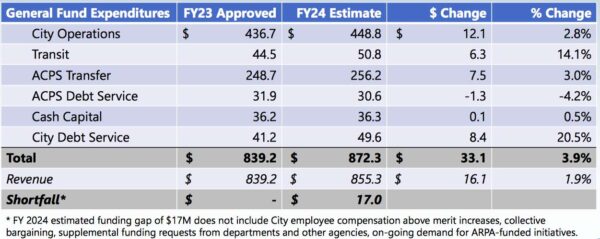
“With these revenue estimates and expenditure estimates, this brings us to a projected revenue shortfall of $16.1 million,” Wilson wrote. “Given that our local budget must be balanced, that shortfall must be resolved with either spending reductions, tax increases or some combination of the two.”
City Manager Jim Parajon, who warned City Council last month that “the budget is going to be tight,” is scheduled to present a budget to Council on Feb. 28.

Alexandria City Public Schools is in the initial stages of organizing a collective bargaining effort for thousands of its employees.
The school system has more than 2,400 employees and pays $11.6 million in salaries, with funds approved by the City Council. That means that any agreement reached between ACPS staffers and the school system will have to be approved by Council.
“In this case, you’re going to be negotiating a collective bargaining agreement for about 80% of your costs,” Mayor Justin Wilson said at a joint City Council/School Board Subcommittee meeting on Monday (Nov. 28).
Wilson continued, “Without some special structure put together, you’re going to be doing so without coordination with the entity that is going to pay those bills. So, I think we need to figure out how we hold hands and put together a process where we can all do this together somehow.”
The news comes shortly after the city and police department came to a collective bargaining agreement. As part of that agreement, which was nearly a year in the making, police officers will get significant salary raises, as well as bonuses for longevity and specialized skills.
Education Association of Alexandria President Dawn Lucas says that her organization is ready to get to work.
“We are ready and willing to work closely during this process,” Lucas told the School Board on Nov. 10. “We believe that having strong collective bargaining will make us more competitive than other school divisions when it comes to retaining and recruiting the very best educators and staff.”
In the meantime, the school system is proposing a 2.64% step increase and 2.5% market rate adjustment for all staff in the upcoming fiscal year 2024 budget. Healthcare costs are also projected to increase 8% and dental care costs will increase 2%.
Interim Superintendent Melanie Kay-Wyatt told Wilson that she will work closely with City Manager Jim Parajon’s office in creating a collective bargaining structure. No timeline has yet been presented.
“We will keep you informed as we are educating our staff on what it’s going to look at , as well as a timeline,” Kay-Wyatt said.
City Council adopted its collective bargaining ordinance last year.
Facing inflation, a $17 million budget shortfall and fewer federal economic recovery funds, the Alexandria City Council will consider a tax increase in its upcoming fiscal year 2024 budget.
City Manager Jim Parajon has been tasked with presenting Council with two budget alternatives — one with a tax increase and another without.
“This year’s budget is going to be tight,” Parajon said at a recent Del Ray Business Association meeting. “We’re also predicting a much slower growth rate than we’ve done in the past. As you can imagine, property tax and the growth in our real estate is what drives a lot of our revenue. And we projected that’s going to be a little slower this year.”
Parajon said that city staff is expecting a shallow recession to impact the city this spring, and is eyeing expenditure reductions. So far, the $17 million shortfall is mostly attributed to an increase in city operations, the annual transfer to Alexandria City Public Schools and city debt service.
Mayor Justin Wilson hopes to not increase taxes, and said that inflation pressures impact city government, just like everyone else.
“We have not increased the tax rate in six years and I am hopeful we can avoid any increase this year,” Wilson told ALXnow.
The city is also contending with collective bargaining agreements with the police and fire department unions. Additionally, ACPS faces a $12 million budget shortfall, and wants to give employees raises.
The current FY 2023 budget saw a $445 (6.5%) increase to residential real estate taxes, although the tax rate of $1.11 per $100 of assessed value did not change.
City staff are also working on re-timing projects in the city’s 10-year $2.7 billion Capital Improvement Program to “better align with ability of operating budget to absorb costs increases and City’s ability to execute projects,” according to a presentation to Council on Tuesday night (Nov. 22).
Parajon will present his proposed budget on Tuesday, Feb. 28 — a week-and-a-half after the School Board approves its budget request. The budget will be approved in May and go into effect on July 1.

Construction and other capital improvement costs for next fiscal year have increased for Alexandria City Public Schools by millions.
More than $14 million out of the $24 million in cost increases for new and existing capital improvement projects is due to supply chain issues and cost escalations, ACPS staff reported in a presentation to the School Board on Monday (Nov. 14).
Site development cost estimates have increased almost 200%, staff reported.
“There have been industry wide cost escalations on everything,” Erika Gulick, the ACPS executive director of facilities, told the Board. “That affects your groceries and your gasoline and affects construction and steel and concrete and everything else that we use to build our schools.”
In the meantime, the City is wrestling with its own capital improvement cost woes. The city is currently in the process of reevaluating its capital projects over the next decade, and says that CIP costs to the operating budget exceeds anticipated revenue growth.
“Approved capital budgets are larger and more complex than our experienced ability to execute capital projects,” City staff said in a presentation earlier this month. “(The) approved capital improvement program needs to be reassessed and placed on more sustainable path.”
The draft ACPS Capital Improvement Plan budget includes the following projects for FY 2024:
- $17.4 million for George Mason Elementary School design, project management and other construction costs
- $5.5 million for the renovation of the fifth and sixth floors of Ferdinand T. Day Elementary School
- $5.1 million for the retrofit of the swing space at 1703 N. Beauregard Street
- $5 million for repair work at William Ramsay Elementary School
- $2.5 million for renovations at Francis C. Hammond Middle School
- $2 million in transportation system upgrades
- $1.5 million for emergency repairs
- $1.3 million for renovations at George Washington Middle School
- $1.2 million for Alexandria City High School stadium renovations, security enhancements and stormwater improvements
- $1.2 million for textbook replacements
ACPS will next conduct a community meeting on the FY 2024-2033 CIP budget on Monday, Nov. 28. The Board will approve the CIP on Dec. 15.
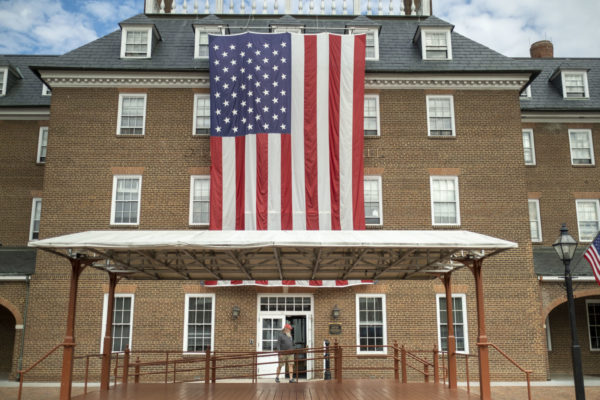
At a City Council retreat, Alexandria leaders met with some of the city’s leading budgetary advisors to discuss some dire signs of what one staff member called a “pasta bowl recession.”
The city’s top finance experts said the city should be cautious as it potentially heads into a period of stagnant economic growth — if not outright decline.
“We don’t want to take a doom and gloom approach,” said Director of Finance Kendel Taylor. “We’re not saying the sky is going to fall, but we actually don’t know. The uncertainty where everyone is sitting right now is fairly significant.”
Taylor said that, as the city begins to plan for Fiscal Year (FY) 2024, the Department of Finance is being cautious.
“When we look at FY 2024: it’s very early,” Taylor said. “We only have a couple months of sales tax… interest rates keep going up, fuel prices, there’s a lot of uncertainty. We’re in a very cautionary stage.”
While the city’s economy is continuing to grow, Taylor said that’s going more slowly than she’d like. While the city averages 4% economic growth, Taylor said her office is estimating only a 2% change.
“We’re still an attractive place to live, we’re still economically sound, but it’s not what it’s been for the last few years,” Taylor said. “We’ve seen a lot of growth in the past year… but really we’ve just gotten back to pre-pandemic levels. That means we missed two years of anticipated growth. It’s a weird environment… It’s something where we have to just be cautious.”
Along with that slow growth, Taylor said interest rates have gone from 3% to 7%, meaning it’s more expensive to buy a house in Alexandria today than it was a year ago.
Vehicle assessments, meanwhile, remain high. The city approved a one-time tax relief for car owners to keep their tax from skyrocketing after vehicle values shot up during the pandemic. Taylor said the city is still monitoring those values this year to see if a repeat of that one-time relief might be needed.
“It’s too early to really know what’s going to happen with vehicles, but values remain high,” Taylor said. “We made an assessment adjustment in 2022 to mitigate those increases. We’re going to keep watching that over the next few months to see what’s the right approach to vehicle values in 2023.”
In brighter news, Taylor said sales tax and meals tax figures have remained strong, exhibiting a commitment from the community to supporting local restaurants and businesses. Those tax levels were restored to pre-pandemic levels in the summer of 2021.
The hotel tax has slowly been crawling back. Taylor said in July the city was within 10% of where the hotel tax was pre-pandemic. In August, it was within less than 1% of pre-pandemic levels.
At the same time, Taylor warned that optimism over tax levels returning to pre-pandemic levels ignores the bigger concern that the city has still lost two years of economic growth.
“It’s great to see that hotels are getting back to pre-pandemic levels,” Taylor said, “but we would have typically seen a few percentage points of growth.”
Kevin Greenlief, assistant director of finance, said the revenue from FY22 was good and FY23 has revenue increases baked into it, but the keyword for FY24 is caution.
“In the second quarter of 2022, [chief financial officers] are beginning to be pessimistic about GDP growth and potential impacts of a recession,” Greenlief said. “The popular term right now is a pasta bowl recession’: a long recession but not a deep one. I’ve seen ranges from a -.4% GDP growth to a .1% positive growth. There’s a lot of debate right now about whether there will be a recession. The smart money seems to think so, but they’re not looking like the sky is falling, it’s that [growth] is going to be flat.”
As the city plans for the future, City Manager Jim Parajon said some of that will involve looking at how much office conversion the city allows. While the city has had numerous positive office conversions — from restaurants to schools — Parajon also warned against throwing the baby out with the bath water. Maintaining some level of office space could be the better long-term play, even if it means losing some revenue short-term.
“The conversion approach for outdated office makes a lot of sense, but I want to be careful that we don’t lose good office space to conversion,” Parajon said. “That’s really important, and that may mean we play out a cycle or two in the economy so we’re looking at a balance of commercial to residential.”
Even when offices do come back, Parajon said they may not resemble the sea of cubicles from the pre-pandemic days.
“We’re likely to see smaller footprint office components with lifestyle office elements,” Parajon said. “They all feed really well into Alexandria because we have an amazing lifestyle here and that’s enticing to a company that needs to recruit and retain talent.”
If you live alone and make less than $49,850 per year, you might be eligible to pick up a check for $500 every month.
The City of Alexandria has put some of its Covid funding to use with a guaranteed basic income pilot a bit of a backronym: Alexandria’s Recurring Income for Success and Equity (ARISE).
The program, led by the Department of Community and Human Services, involves 170 randomly selected individuals who meet certain household income limits. Those selected will be provided with $500 every month for 24 months to spend in any way they choose.
Those who meet the income eligibility requirements can apply online from Oct. 31 to Nov. 9.

“Guaranteed income pilots have proven to impact poverty and economic inequity by enabling participants to determine for themselves the budgetary strategies that will most benefit them and their families,” the city said in a release. “ARISE will help the city test a bold, new way to ensure people have what they need to make decisions to support their well-being.”
The idea of a guaranteed income, or a universal basic income, has been a hot topic in recent years, implemented in cities like Los Angeles and San Diego.
“We are providing financial resources to individuals and families so they are empowered to decide how to best meet the needs in their lives,” Mayor Justin Wilson said in the release. “We are creating this unique program to evolve the ways that we assist our neighbors in need of extra support. That is what ARISE is about.”
There are no citizenship or work requirements to be eligible, but individuals must be City of Alexandria residents who are 18 years or older and earn less than the caps above. Those caps are set at below 50% of Alexandria’s area median income.
“A community webinar on October 25 from 7-8 p.m. will provide information about the ARISE study and how to apply,” the city said in the release. “Amharic, Arabic and Spanish interpretation will be available. All eligible City residents are encouraged to apply for a chance to receive extra income and the ability to make choices that could improve their financial well-being, quality of life and future.”
Melanie Kay-Wyatt says that she lives by one word — impact.
With just a month under her belt as interim superintendent of Alexandria City Public Schools, she’s got a mountain of responsibility to contend with, including managing the first days of the 2022-2023 school year, developing the school system’s upcoming budget, and forging relationships with city leaders.
“My faith keeps me strong, keeps me grounded,” Kay-Wyatt told ALXnow. “But every day the word that I say to myself is impact, impact, impact. What impact am I going to have on someone else, or what impact are they going to have on me?”
Kay-Wyatt-s new office in ACPS Central Office is sparsely decorated. The walls are completely bare, and there are a few small framed photos of her family and her oath of office as interim superintendent. She says that her predecessor, Gregory Hutchings, Jr., gave her lots of advice before his last day at the end of August.
“He said to be passionate, continue to be who I am,” Kay-Wyatt said.
All this comes as the school system continues with a teacher and bus driver shortage, lagging standardized testing scores, and safety issues. A recent safety report shows that there were 46 students arrested and 68 injured last school year, and the school system is now using the 2021-2022 school year as a baseline for future improvement.
Kay-Wyatt said she approaches her workload with passion.
“Let me tell you what the work is like,” she said. “If you see it as a work of being something to control, it’s not a passion, right? And this is a passion for me. That’s what I do, that’s why I’m here — to have an impact. Please know that any educator that comes into any building every day, does not see it as controlling or doing something. It’s about having an impact in making a difference, and that is very different than going to a job where you’re just clocking in hours. The work that we do has impact. It changes lives. It changes families.”
Kay-Wyatt is also tasked with delivering the School Board her recommendation on the future relationship between ACPS and the Alexandria Police Department’s contentious school resource officer program. The SROs — police officers assigned to the city’s high school and middle school campuses — were defunded between August and October 2021, and were brought back by City Council after numerous violent incidents with weapons in schools.
“My position is to do what I need to do to keep our schools and campuses safe,” she said when asked her position on policing in schools. “I’m building a partnership and making connections since I’m the new superintendent, to make sure that I have connections with the city manager, with the police chief and then we will work collaboratively to keep our school safe.”
Kay-Wyatt was hired last summer as the ACPS chief of human resources. She will have the interim superintendent position for at least this school year or until a permanent superintendent is chosen in a national search. It’s still too early to say whether she will throw her hat in the ring for the permanent position, she said.
“That’s a personal decision I’ll make when the time is right to answer all of that,” Kay-Wyatt said.
A native of Landover, Maryland, Kay-Wyatt has a bachelor’s degree in business administration from Mary Washington College, a master’s degree in education from Old Dominion University, a master’s in educational leadership from University of Mary Washington and a doctorate in educational leadership from Virginia Commonwealth University. She previously worked in human resources in Spotsylvania Public Schools, and as a principal, assistant principal and special education teacher at Fredericksburg City Public Schools.
Alexandria City Public Schools is entering a tricky budget season.
As student enrollment and expenditure increases outpace revenue, ACPS faces a $12 million deficit in the run up to the fiscal year 2024 budget, according to a budget presentation to the School Board on Thursday, September 22.
“Over the previous decade, student enrollment and expenditures have increased at a far quicker pace than the corresponding revenue has grown,” ACPS said in a staff report. “ACPS Staff analysis shows that this trend will continue into the future, requiring a combination of revenue enhancements and expenditure reductions to balance a projected budget gap.”
For FY 2024, the projected budget deficit is $12.05 million. Each year, as expenditures outpace revenues, the estimated budget gap will continue to expand. By FY 2028, the annual funding deficit projection grows to $37.83 million, according to ACPS.
Still, the school system is proposing a 2.64% step increase and 2.5% market rate adjustment for all staff. Healthcare costs are projected to increase 8% and dental care costs will increase 2%.
“We assume that we’ll get the same per-people dollar amount at both the state and city level (as approved the FY 2023 budget),” ACPS Chief Financial Officer Dominic Turner told the School Board.
There are 15,700 students at ACPS at this time, according to interim Superintendent Melanie Kay-Wyatt. That’s about 100 students more than was forecasted in January, and some parents are concerned that elementary school class sizes are getting too big. Last spring, the school system adjusted the caps on elementary school class sizes by an increase of two seats so that kindergarten classes now have 24 students, first and second grades are capped at 26, and grades three to five have 28 students — still below maximum state standards.
Jenica Patterson, the PTA president at Patrick Henry Elementary School, told the School Board that the school is contending with 950 students — about 65 more than what was projected.
“The discrepancy in teacher-to-student ratios among ACPS elementary schools is a major barrier to learning.,” Patterson said. “Teachers are simply managing the large, crowded classrooms instead of dedicating their time to education and learning.”
Kay-Wyatt said that the community has grown over the years, and that ACPS is experiencing a teacher and bus driver shortage.
“It’s very hard right now,” Kay-Wyatt said. “The HR staff is out recruiting, they continue their recruitment efforts. I also want that to be known that we never stop recruiting, and we still have a shortage.”
Next month there will be several budget-related work sessions and meetings:
- Wednesday, October 12: Capital Improvement Program (CIP) Work Session with City Council/ACPS Joint Facilities Planning Session
- Monday, October 17: Joint City Council/School Board Sub Committee
- Tuesday, October 18: Joint CIP Work Session with City Council
It’s been nearly two months since the International Association of Firefighters Local 2141 tweeted about staff holdovers or equipment failure. For years the union has alerted the public of major outstanding issues, but their silence isn’t because things are getting better.
Things are just really busy, says union President Captain Josh Turner.
During the week of July 4, Turner worked more than 100 hours straight, in addition to leading the union’s collective bargaining negotiating team. Turner and his team are working with the city to hammer out a collective bargaining agreement by mid-November — just before the first City Council budget retreat.
“There’s a lot going on here,” said Union President Captain Josh Turner. “Everybody on the on the union side of negotiation team already works a 56-hour work week, and we continue to have staffing issues.”
So our union president, who is currently leading our first ever collective bargaining negotiations with the City… worked over 100 hours for the department this week due to the City's short staffing issue… (not including any of his union work)… That's not ideal.. https://t.co/KDp5TBvnJW
— IAFF Local 2141 (@IAFFLocal2141) July 4, 2022
Mayor Justin Wilson did not comment on what negotiated agreements with the Fire Department, Police Department and Sheriff’s unions could mean budget-wise for the city.
“The (City) Manager has certainly kept us updated on the ongoing negotiations with both the police and fire union,” Wilson told ALXnow. “We hope to conclude those negotiations in the next few weeks/months.”
Fire Chief Corey Smedley has attended a handful of the negotiating sessions, and said that his staff have received significant raises in the fiscal year 2023 budget, which went into effect July 1.
“The department needs everybody to do their part,” he told ALXnow. “Whether that’s our firefighters and paramedics on the front line, whether that’s our human resource professionals and other support staff, we need them to continue to do great work that they do every day.”
Smedley continued, “The frontline personnel, firefighters and paramedics have or will receive anywhere between a 9% and 12% raise this fiscal year, with the combination of their market scale adjustment and their merit increases.”
The fiscal year 2023 budget included a 7% raise for firefighters, medics and fire marshals; a 6% raise for Police Department and Sheriff’s Office staff and a 4.5% raise for general city employees.
The raise fell short of the 10% that the union wanted, and while the financial terms and conditions of the collective bargaining remain tightly under wraps, firefighters have been hit by inflation.
“The fire department’s on fire,” Turner said. “You can make $14,000 more a year as a paramedic in Loudoun County than you would here in the city. Frankly, our members live out there anyway because they can’t afford to live in Alexandria. I got guys going, ‘Hey, man, why would I stay? I love the community. I want to be here, but I’m driving through three counties, including the one that’s going to pay me more, to get to Alexandria.'”
In July, the union said that frequent equipment failures put the lives of residents at risk.
According to the Alexandria Fire Department, between August 2021 and August 2022, about three AFD staffers were held over per day.
The department has 289 sworn employees and 23 civilian employees, and the department needs 347 to be fully staffed. Additionally, 25 employees (sworn and civilian) left the department this year, and AFD training academy expects 19 new recruits to graduate in January.
Smedley says the department needs 26 more sworn and civilian positions, and that the FY2023 budget allows him to hire 20 staffers to fill the gap.
Additionally, Smedley said that AFD should, within the next several weeks, receive several new vehicles.
“We have also purchased some fleet that we are anticipating within the next couple of weeks receiving and being able to place in service so that we can ease some of the burden of our older fleet,” Smedley said. “We are receiving in the next couple of weeks to place in service five new ambulances.”
THE COUNT – The City of Alexandria has now had at least one unit in the fire department out of service every day for ELEVEN MONTHS STRAIGHT!
On August 12th, we'll hit a full year of providing less service to the City of Alexandria due to short staffing.
Absurd.
— IAFF Local 2141 (@IAFFLocal2141) July 11, 2022


